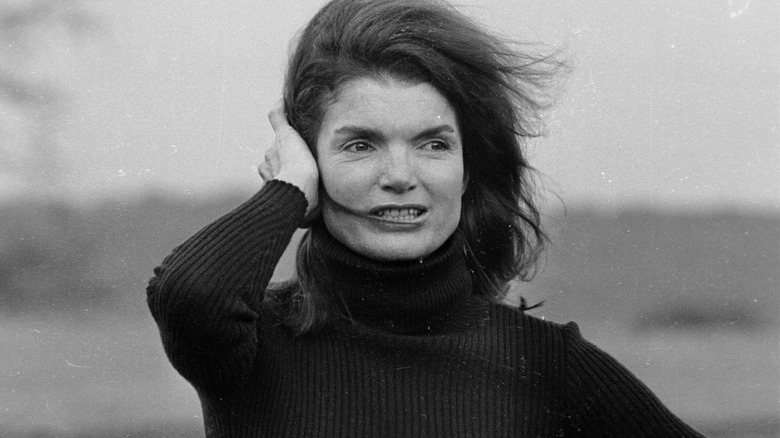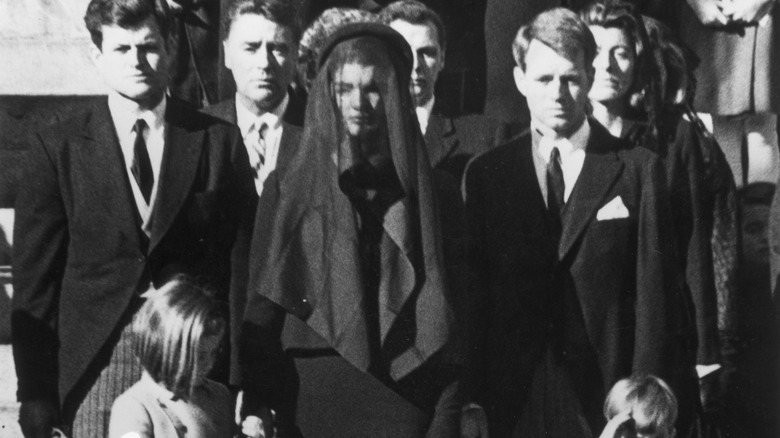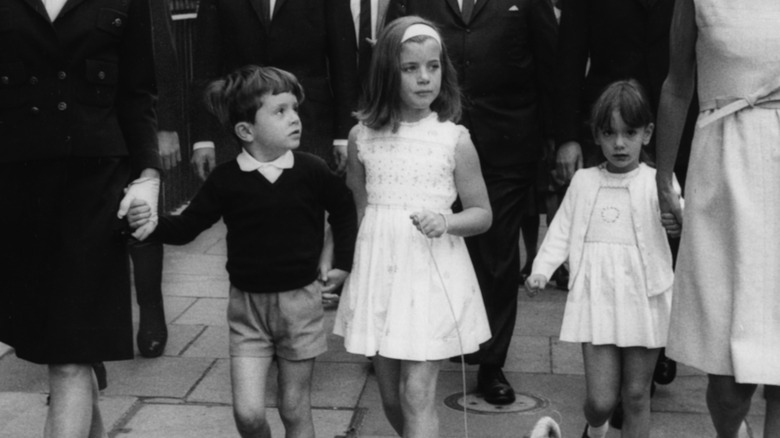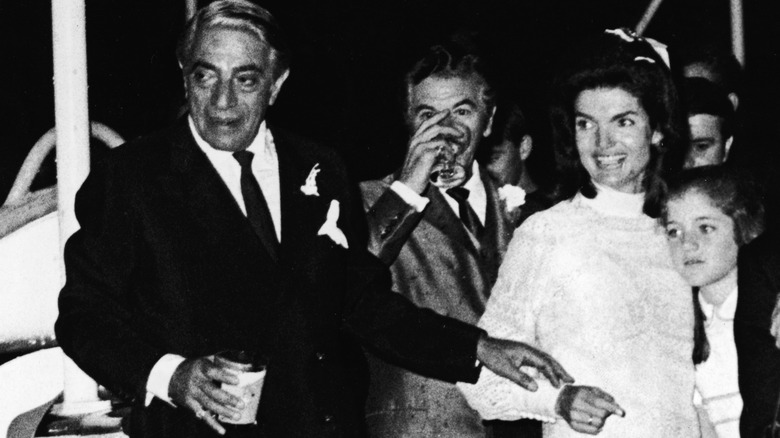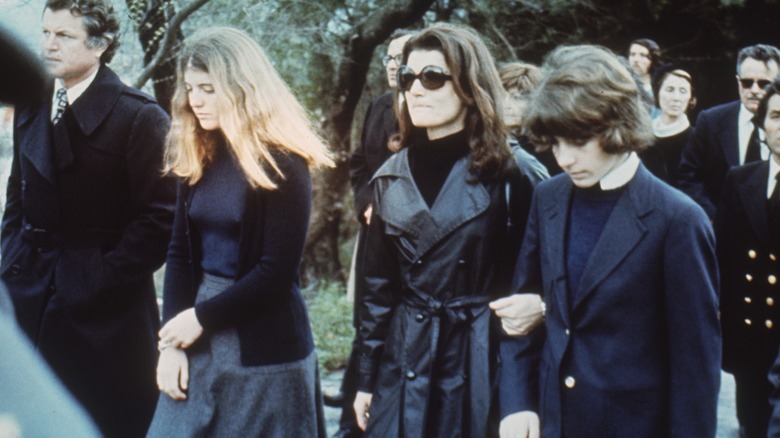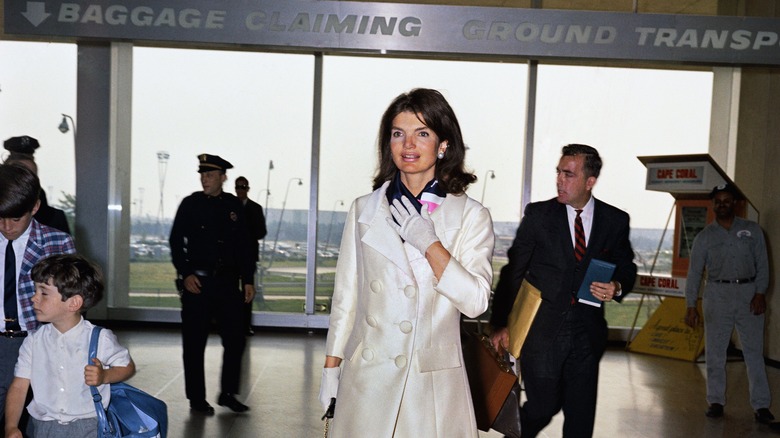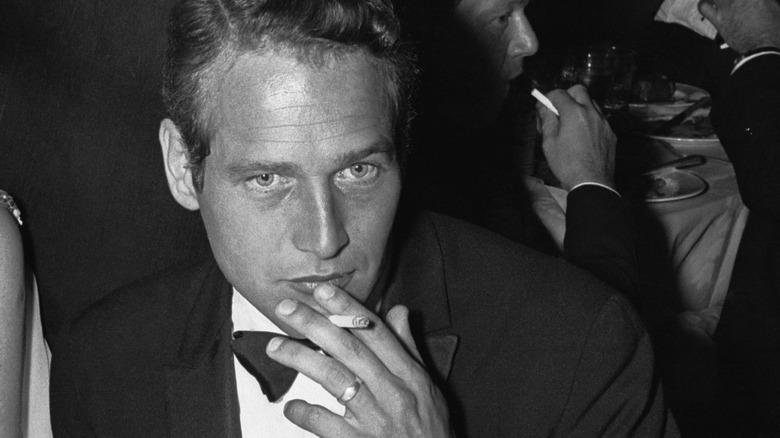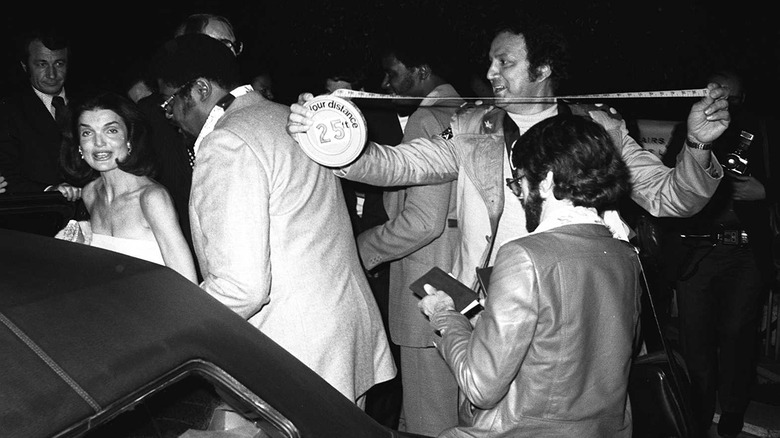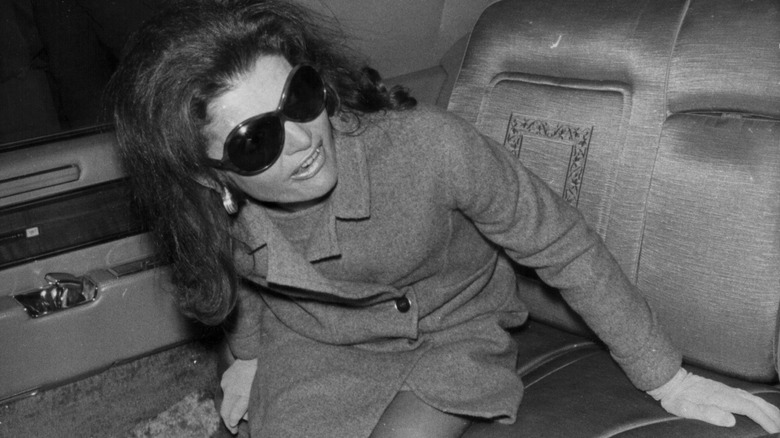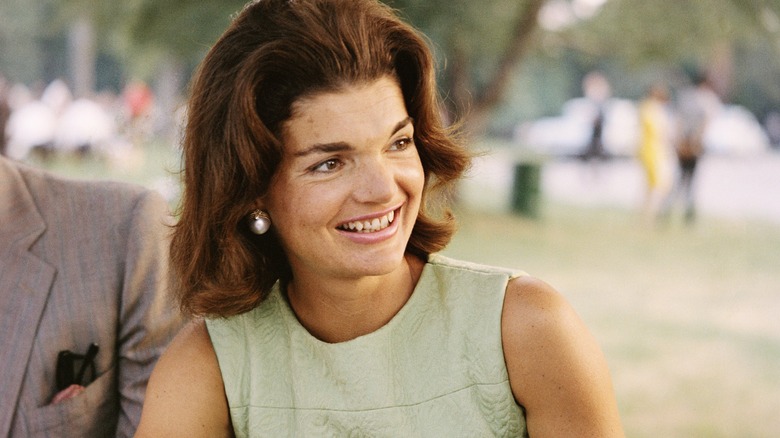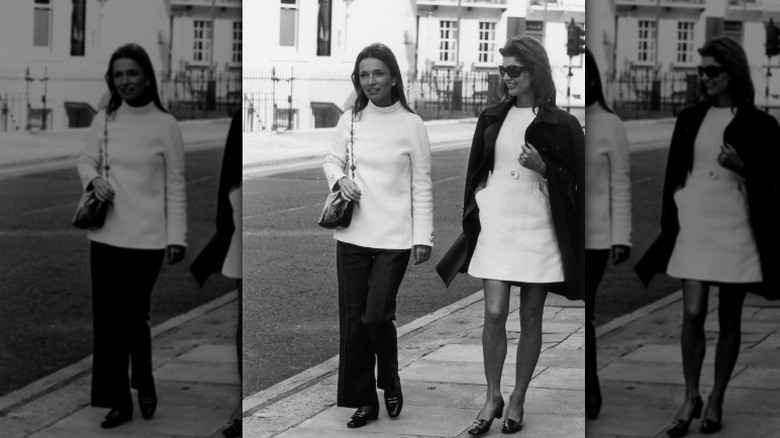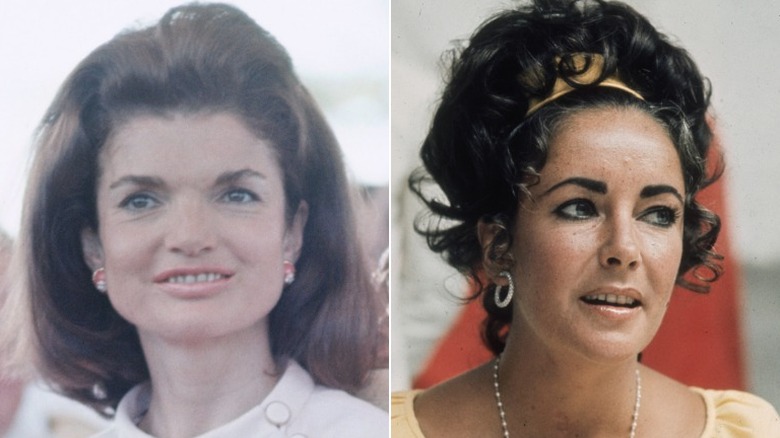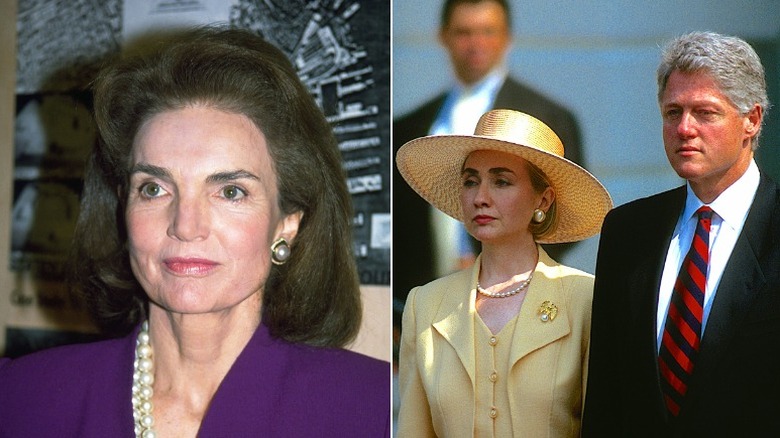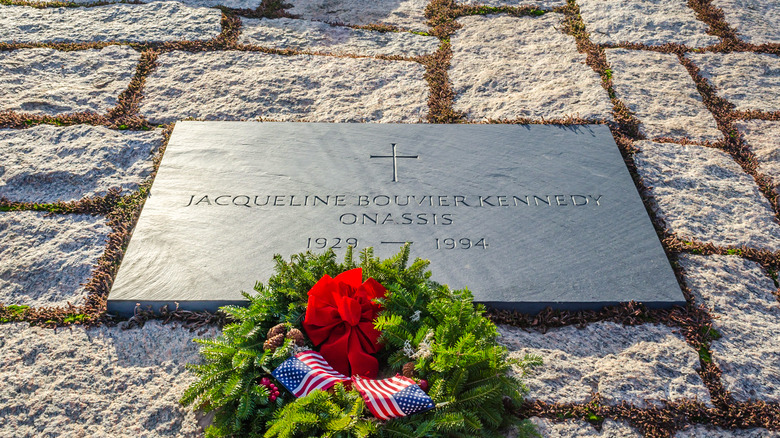Jackie Kennedy Was Never The Same After JFK Died
Jackie Kennedy was sitting beside President John F. Kennedy in a limousine when the bullets pierced through her husband, and his life dissipated before her eyes. JFK's blood splattered across Jackie's pink suit, staining more than the fabric. It was a day that changed the nation, but it was also a day that would change Jackie forever.
When the suddenly former First Lady boarded Air Force One, a new set of clothes awaited her, and she began cleaning her face. "One second later, I thought, 'Why did I wash the blood off?' I should have left it there; let them see what they've done," Jackie later told Life magazine (via Biography). Jackie was well versed in using clothes to make a statement and saw the powerful message of her stained suit at that moment. As Lyndon B. Johnson took the presidential oath, Jackie stood for the world to see, marked by her husband's blood — a reminder of JFK and the tragedy that befell him.
It was a long day, followed by many more long and sleepless nights. Despite Jackie moving out of the White House and away from politics, the terror moments from the assassination on November 22, 1963, remained. The suit survived unwashed and forever stained, but Jackie Kennedy was never the same after JFK died.
She grieved in the arms of her dead husband's brother
The Kennedys were known for passing women between each other, even from father to son. So when Robert "Bobby" Kennedy fell for his dead brother's widow, it must've seemed practically normal to him. But how did Jackie Kennedy end up locking herself in hotel rooms with her married brother-in-law?
It was more than a familiarity with each other or the grieving rebound of a widow. Bobby understood Jackie's pain because it was his pain too. They both loved the man lost and could console each other in a way few other people on the planet possibly could. It wasn't a romantic whirlwind of a relationship, but an understanding of the other person and what they needed.
While the affair lasted several years, with vacations locked in their shared rooms, it was an open relationship. Similar to Jackie and John F. Kennedy's marriage. But this time, Jackie was fully consenting and took advantage of the terms. Sadly, it wasn't the arms of another lover or Jackie's realization that Bobby was a womanizer that ended the relationship, but the hands of another man holding a gun. On June 5, 1968, Robbert Kennedy was shot and killed.
She feared for her children
After the second Kennedy assassination, Jackie Kennedy saw a pattern beginning to emerge. She feared there was a plot against the family she'd married into and wondered how such a vendetta would play out against her children. Would she end up by their deathbeds staring at yet another bullet wound seeping the life from a person she loved? It wore on her, filling Jackie with anxiety and fear.
As her distress grew, she began to wonder if America was safe for her family, considering whether or not leaving the country could protect them from the paranoid plots she believed were very real. It was in the depths of her depression and the dark ruminations of anxiety that her sister invited her on a trip to get away.
Jackie was grappling with more than paranoia; it was a mother's worry for her kids. Caroline's relationship with her dad was special, something Jackie could never replace. And now John F. Kennedy Jr. was left without a father to guide him. She wanted them to have more than protection; she wanted them to have a family. Amid everything, the fear chipped away at her confidence in parenting her children on her own.
Her name was never the same after JFK died
The Greek shipping magnate, Aristotle Onassis, wanted Jackie Kennedy long before John F. Kennedy died, but Robert Kenndy's assassination finally gave him his chance. Onassis had been seeing Jackie's married sister, Princess Lee Radziwill, but once the affair ended and the former First Lady was no longer distracted by a Kennedy, Onassis made his move. Seemingly, her fear for her children made her vulnerable and anxious to find security.
Onassis wasn't interested in fatherhood; he'd barely given his own children attention. But as one of the wealthiest and most powerful men in the world, parenting was no worry. Onassis was used to getting what he wanted, and Jackie was his desire. Onassis was so controlling that before his death, JFK had ordered the Secret Service to keep Onassis away from the U.S. and from his wife but the Greek oligarch came to the U.S. for JFK's funeral anyway (via the Daily Mail). To Jackie, Onassis was a rich and powerful man who could ensure her children's safety. The pair married in 1968 and she became "Jackie Kennedy Onassis" or "Jackie O."
What Jackie didn't know about her new husband was that he was a violent man with a desperate need for control. He kept tight reins on her, not allowing her to work and expecting the "good wife" he saw in the media. Jackie was a strong woman but she also feared for her family without Onassis' protection.
She was twice widowed and marred by assassinations
Robert Kennedy's death came after winning the California presidential primary election on campaign promises of healing the country's growing division. It was a hard year for the U.S., with Martin Luther King's assassination, Americans pushing against the Vietnam War, and a seemingly endless procession of protests. The country had yet to fully heal from losing John F. Kennedy, and suddenly the hope they saw in his brother was snuffed out again by a bullet from a stranger.
As if Jackie Kennedy hadn't experienced enough loss, she was on another lover's deathbed less than a decade after Robert Kennedy's assassination. Her husband, Aristotle Onassis, left her twice-widowed at 45. Losing her husband meant losing the safety she'd married Onassis for, leaving her exposed and vulnerable once more. It was a different loss from JFK or Robert, but one just as full of unanswered questions and fear for what lay next.
She found solace in her work
Jackie Kennedy could let fear consume her again, or she could take control. This time around, Jackie chose control. Before Jackie was "Jackie O" or even a Kennedy, she was a journalist. And despite so much tragedy, her love for the arts remained.
She became an editor at Viking Press New York City, now known as Penguin. The publishing company allowed her to work with authors, making her mark on books before publication. She could do real work there — see her name in print for more than her iconic style and tragic past. Unfortunately, when a book she played no part in received backlash, a New York Times reviewer seemingly blamed her, stating: "Anybody associated with its publication should be ashamed of herself." Without naming Jackie, the use of "herself" intended to call out editor Jackie Kennedy Onassis.
It didn't stop her, though. Jackie hadn't let one of the most powerful men in the world control her so a newspaper reporter wouldn't either. Instead, she took a job at Doubleday, eventually landing the role of Senior Editor. She helped over 100 books reach publication and worked until she died in 1994 despite inheriting a reported $26 million from Onassis. The publishing world was probably the only place where she could exist in a semblance of normalcy, earning notoriety for her feats alone.
She allegedly had a love affair with Paul Newman
Jackie Kennedy enjoyed a flirtatious life. Many described her as an attractive force of nature, and as such, she earned many love interests. Long before John F. Kennedy, there was a line of suitors and past rendezvous. There was even one man Jackie Kennedy almost married before JFK.
After JFK's death, Jackie didn't let her tragic losses stop her from enjoying the arms of other lovers. One of the more enticing affairs was between her and actor Paul Newman. It was but a one-night stand amid her relationship with Robert Kennedy, and yet it continues to be the talk of gossip rags.
What makes this affair so salacious isn't Jackie's involvement with Robert at the time, but Newman's dedication to his wife. Everyone saw Newman and Joanne Woodward as one of Hollywood's strongest couples. Jackie went from being the nation's First Lady to the "other woman" in America's new sweetheart couple. Fortunately, Newman's marriage endured. His love for his wife was unchanged, and the one-night stand was quickly swept under the rug, at least for the married couple.
She experienced the never-ending press of paparazzi
Photographer Ron Galella described following Jackie Kennedy around as one of the highlights of his career, but for the former First Lady, it was endless harassment. He'd stand outside her home waiting to get a shot of her — following her and her kids. She was under his constant surveillance. Galella was much worse than the rest of the paparazzi obsessed with Jackie; he made his pursuit personal.
The photographer referred to her as "my girlfriend, in a way" (via Town & Country) and said "she liked to be pursued." He described an encounter where she confronted him about hunting her for months with more focus on her hand on his wrist and her hushed tone than her plea to leave her alone. Galella said of the moment: "She'd go to Jersey for those hunts with the fox and the horses, and she felt that I had pursued her like I hunted her. ... She liked [it]." It was a psychologically destructive way to live, particularly for a woman who suffered so much at the hands of men who disregarded women's consent. Galella's hunt lasted most of Jackie's life after John F. Kennedy died.
In 1981, in the wake of two lawsuits from Jackie, Galella was threatened with 60 years in prison if he didn't stop following the former First Lady. Finally, she could relax. Jackie spent the last 13 years of her life out of the constant watch of her most vigilant stalker.
Self blame and thoughts of ending it all haunted her
Jackie Kennedy had a complicated relationship with fame. According to a conversation with Bishop Philip Hannan at John F. Kennedy's burial, "[Jackie] did not want to be a public figure" (via Vanity Fair). She knew it was a lifetime burden, but without JFK to help, the weight seemed to crush her, creating a wave of unease.
Nightmares plagued her mind after JFK's death, according to friends (via People). She'd imagine ways to save him just to see his death in her mind all over again. Jackie didn't think about the aim of the shooter. Instead, she thought of her movements and how a change in them could have traded her life for her husband's. But there was no trade; she'd survived where he had died, and guilt made her contemplate taking her own life.
It wasn't a new ideation for Jackie. She struggled with her mental health after the brutal treatment at Valleyhead Clinic — a psychiatric ward where JFK admitted Jackie after a fight about his philandering. The electroshock therapy did nothing for her depression over her husband's mistreatment but left Jackie with thoughts of her death. Jackie was lucky to have the support of her sister, friends, and care treatment, allowing her to live for several more decades.
If you or anyone you know is having suicidal thoughts, please call the National Suicide Prevention Lifeline by dialing 988 or by calling 1-800-273-TALK (8255).
She struggled with alcohol and pills
The tragedy surrounding the Kennedy family, the harassment from the press, and her marriage to the controlling Aristotle Onassis no doubt influenced Jackie Kennedy's dependency on alcohol and drugs. But her indulgence began long before John F. Kennedy's death, according to "These Few Precious Days: The Final Year of Jack with Jackie" (via the Independent). Both the First Lady and the President took injections of amphetamines from a man dubbed "Dr. Feelgood" despite warnings the doctor had driven past patients to mental breakdowns.
So, in the depths of depression, Jackie already knew who to call for the means of escapism. However, her sister, Princess Lee Radziwill worried she was drinking too much and taking too many pills. When Jackie called Radziwill to contemplate ending her life, her sister rushed to Jackie's home and got rid of temptations.
Eventually, Jackie went to therapy and stopped taking drugs altogether. "She dealt with it head-on, and [the drug use] did not continue in her life after the late '60s. She just stopped," noted J. Randy Taraborrelli (via People). "Pretty typical of the way Jackie would do such a thing. She just made up her mind and then that was the end of it."
If you or anyone you know needs help with addiction issues, help is available. Visit the Substance Abuse and Mental Health Services Administration website or contact SAMHSA's National Helpline at 1-800-662-HELP (4357).
Rumors spread that her sister was jealous of the attention she was receiving
After John F. Kennedy's death, gossip suggested that Jackie Kennedy's sister, Princess Lee Radziwill, was jealous of the attention her sister was getting. The rumor mill was run by Truman Capote, known in New York for the herd of socialites he collected, dubbed his "swans." These "swans" were the most influential women in the city and, as such, were highly desired by the rest of New York.
Whether the friendship was real or fiend, Capote made Radziwill one of his "swans." As Capote leaned in closer to his friendship with the princess, she loosened her guard around her feelings, eventually exposing the long-held jealousy her sister inspired. And Capote got it; he related to her experience and even empathized with it, according to the book "Capote's Women" by Laurence Leamer." Apparently, all the things people give Jackie Kennedy credit for were actually owed to her sister. "She's all the looks, style, taste — Jackie never had them at all, and yet it was Lee who lived in the shadow of this super-something person," Capote once said of Radziwill (via People).
However, Radziwill denied any feud with Jackie and even kept a photo of the late John F. Kennedy by her bedside in support of her sister. "It's just the most ludicrous talk in the world that we're rivals," Radziwill told People in 1976. "We're exceptionally close and always have been. We're together very often. In fact, endlessly."
She and Elizabeth Taylor were pitted against each other by the media
Magazines and newspapers covered Jackie Kennedy as if she were a movie star — the likes of Elizabeth Taylor. The two were constantly splashed across cover pages, one to sell a product or movie, the other as the former First Lady. But it wasn't their jobs the magazines contrasted; instead, it was their images.
The media portrayed Jackie as the quintessential good woman, perfectly poised, well-educated, and strong. She stood in support of her husband no matter his faults, demonstrating to women everywhere the "right way" to behave. The same publications questioned the ability of Elizabeth Taylor to be such a woman. These comparisons became so rampant the two ended up intrinsically linked. They'd become day and night.
Sadly the feud wasn't a fantasy of the media either. Taylor's journals revealed Jackie harbored significant resentment against her. Despite insisting that they never slept together, Jackie was sure Taylor seduced John F. Kennedy. At least one source claims JFK and Taylor had a threesome with Robert Stack two years before he married Jackie (via RadarOnline). If the account is true, the concerns seemed more practical than paranoid for the former First Lady, so the feud between Taylor and Jackie didn't end until they died.
She may have influenced Hillary Clinton to stay with Bill
It's well known that Jackie Kennedy broke her long-held silence with politicians to invite the Clintons to a gathering on her friend's yacht after Bill Clinton's presidential victory. What was less televised was the private luncheon Jackie held with Hillary Clinton after Bill's inauguration. Hillary later noted a conversation on the invaluable advice she received from Jackie on maintaining privacy in her family life (via the Seattle Times).
Is it possible the advice included ways to handle a husband's infidelity? And if so, did Jackie tell Hillary to stay with a cheating husband? It seems unlikely, considering the former First Lady's anguish at the hand of her husband's infidelities. Considering the account of Bill almost forcibly trying to seduce Jackie at her home in New York, it seems all the more inconceivable.
In "Bill and Hillary: So This Is That Thing Called Love" by Danforth Prince and Darwin Porter, Jackie confided to a friend about the similarities between Bill and John F. Kennedy. "I was flattered that I turned him on so much at my age, but Bill was just like Jack in the sense that neither of them wanted to take 'no' for an answer," Jackie allegedly told a friend, according to the book "Bill and Hillary" (via the Daily Mail). "Ever since that day I prefer not to be alone in the same room with Bill. I fear he's a man who never gives up."
New York City became her safe place until her death
When John F. Kennedy died, the vice president was inaugurated as the new president, and the White House was no longer home to Jackie Kennedy. The widow moved her children to a Georgetown property in Washington D.C. owned by a friend and retired politician. It was a temporary move while she figured out how to reassemble the broken pieces of her life.
Jackie was tired of politics. Her role as First Lady and Washington D.C. held no allure. On the other hand, New York City was a place of promise and once she moved there, she never left for longer than an extended vacation. Even during her marriage to Aristotle Onassis, she maintained her residence there. It seemed New York became her safe place, a haven where she could hide in the anonymity of the crowds.
The spotlight was a significant burden for Jackie, making her love her small one-window office at Doubleday where her coworkers treated her like just another team member. When Jackie lost her battle with non-Hodgkin's lymphoma, she was tucked safely away where she felt most at home. Jackie's net worth at the time of her death was a little over double what she inherited from her second husband, and her notoriety was just as grand as her days of marriage with JFK. But it was likely that her old familiar home in New York provided her the most comfort as she took her final breath.
